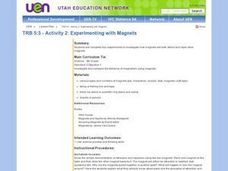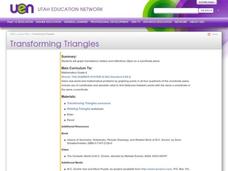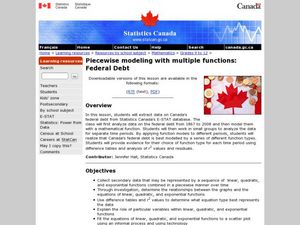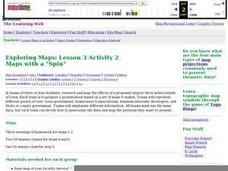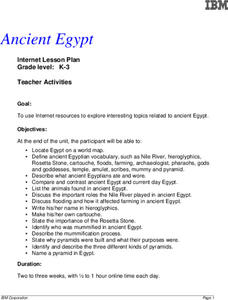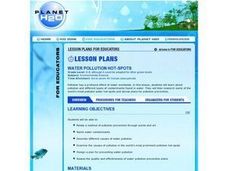Curated OER
Earthquakes
Fifth graders explore the causes of earthquakes and the various types of fault lines through a variety of hands-on demonstrations using prepared cakes. They record their observations in their science journals.
Curated OER
Experimenting with Magnets
Fifth graders complete four different experiments in classroom stations to investigate how magnets attract and repel.
Curated OER
Dude, Where's My Karma?
Students research various aspects of Indian culture. They create a Book of Knowledge about India. In a second activity they research the history behind any game. They make presentations and play the different games during Game Day.
Curated OER
Texture in Fashion
Students participate in an activity where they are blindfolded to guess what type of fabric it is, relying on their sense of touch. They discuss different items in the classroom that have texture and give a list of words that describe...
Curated OER
Pets - Stuffed Animal Day
Students listen to Courtney Baker's, "The Perfect Pet," on a day they bring a stuffed animal to school. They graph the types of stuffed animals that their classmates brought to school before answering questions based on the graph. Next,...
Curated OER
Food Pyramid and Dietary Guidelines
Students examine Food Guide Pyramid and Dietary Guidelines. They look at samples of serving sizes, sort different foods into their correct groups, complete worksheets to discover which types of foods they eat regularly, and discuss...
Curated OER
Transforming Triangles
Sixth graders graph translations (slides) and reflections (flips) on a coordinate plane. They visualize and identify geometric shapes after applying transformations on a coordinate plane. Finally, 6th graders write a paragraph telling...
Curated OER
Boot Reer Root Beer
Fifth graders investigate chemical reactions. In this physical science activity, 5th graders make dry ice root beer and identify the type of change that occurs to the root beer mixture.
Curated OER
Piecewise Modeling with Multiple Functions: Federal Debt
Young scholars analyze data on debt and write an equation. In this statistics lesson, students are given data from different time periods, and are asked to graph and analyze the data. They work in groups, and are assigned different parts...
Curated OER
Maps with a "Spin"
Students, in groups, research and map the effects of a proposed airport three miles outside of town. They prepare a presentation based on a set of maps they make and explains its different points of view from the viewpoints of the town...
Curated OER
Data Collection
Students investigate qualitative and quantitative data. In this statistics activity, students gather data on heights and weights of people and graph the distribution. Students discuss the differences between qualitative and quantitative...
Curated OER
Brillant, Beautiful Bats!
Students use the internet to gather information on bats. They write their own bat poem and describe the differences between the parts of a bat's body. They identify how bats are important to humans and how they control the insect...
Curated OER
Ancient Egypt
Students use the internet to research topics on Ancient Egypt. They practice using new vocabulary and identify the types of food they ate and clothing they wore. They explain the role of the Nile as well.
Cold Spring Harbor Laboratory
Living Things Share Common Genes
Everything evolved from a common ancestor, but how did modern plants and animals develop so many more genes? Scholars use an online interactive to learn about the process. They begin to understand common genes with an animation, multiple...
Curated OER
Development, Trade, Aid
Twelfth graders study the term development. In this Economics lesson, 12th graders explore the role of trade in stimulating development, with particular focus on the role played by the British Government. Students decide how aid...
Curated OER
Fabric Construction Chart
Students in sewing class review the various types of natural and synthetic fabrics. They take notes about fabric construction and match woven, knit, and non-woven fabric samples to fabric construction charts. They make specific...
Curated OER
Fibers and Fabric
High schoolers are introduced to a variety of different fibers. After acting out a short story, they discover how yarn and basic weaves are made. To end the lesson, they practice making their own weave pattern using paper strips and...
Curated OER
The Unseen Army: Conscientious Objectors During World War II
Learners study World War II and why it was called "the Good War". In this World War II lesson high schoolers identify the different kinds of conscientious objectors.
Curated OER
Classifying Monocot And Dicot Plants
Sixth graders identify the parts of a flower, and tell the difference between monocots and dicots. They group plant by leaf types and characteristics placing the information in table form on the computer.
Curated OER
Deciphering Community
Students explore the concept of a community. They identify and group various kinds of communities. Students create a concept map exemplifying their membership in different communities. They write a narrative describing their...
Curated OER
Water Pollution Hot-Spots
Students complete internet research in small groups to identify types of water pollution, spotlight water pollution hot-spots, and design a plan for water prevention.
Curated OER
Rock Hounds at Heart
Second graders read "Sylvester and the Magic Pebble" by iam Steig and practice describing rocks using different physical properties. They make observations and develop and describe categories such as texture, color, density, hardness, etc.
Curated OER
Community and Me
Students continue to examine the concept of communities. In groups, they identify and create a list of their needs and wants and create artwork showing their community working properly. They describe the differences in communities...
Curated OER
Developing Soundproofing Materials
Eighth graders investigate the acoustic properties of materials in order to develop soundproofing products. In this soundproofing lesson students research different resources, design and perform experiments and fabricate, test and...



